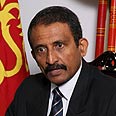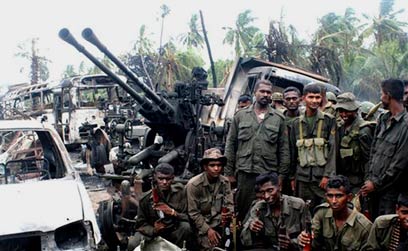
Sri Lankan ambassador: We back Israel's war on terror
Donald Perera, who served as Sri Lankan chief of staff during offensive that ended in Tamil rebels' surrender after more than 30 years, is enjoying a change of pace in Israel. In interview with Yedioth Ahronoth, he recalls seeing body of rebel leader Prabhakaran, says IDF needs public's support to successfully eradicate terror. 'Citizens must realize struggle will exact a heavy price,' he adds
Donald Perera saw the blood-soaked stretcher carrying the body of Velupillai Prabhakaran being transported through the jungle, but he was not calm. Air Chief Marshal Perera, the Sri Lankan chief of staff at the time, had been chasing after the leader of the Tamil Tiger rebels who had terrorized his country for over 30 years. He wanted to make certain that the lifeless body in front of him was indeed that of his long-time adversary.
"I asked to see his personal gun," recalls Perera. "I knew precisely what type of gun he was carrying, as well as its serial number. Only when I saw the number 001 did I realize that he had finally been taken out. I drove home, took off my uniform and told myself that now I can retire."
Perera, 60, has since been appointed Sri Lanka's ambassador to Israel. His wife, a military dentist, and his daughter, a university student, remained in Sri Lanka.
"I was familiar with Israel before coming here," he tells the Yedioth Ahronoth daily. "In the framework of my previous positions as air force commander and chief of staff, I had a great relationship with your military industries and with Israel Aerospace Industries.
"For years Israel has aided our war on terror through the exchange of information and the sale of military technology and equipment," says Perera.
"Our air force fleet includes 17 Kfir warplanes, and we also have Dabur patrol boats. Our pilots were trained in Israel, and we have received billions of dollars in aid over the past few years. This is why I asked to be assigned to Israel – a country I consider a partner in the war against terror. Many Sri Lankans admire Israel," says Perera, a native of the capital Colombo.
As chief of staff, Perera commanded over 240,000 soldiers. His greatest challenge was to crush the Liberation Tigers of Tamil Eelam (LTTE), or Tamil Tigers, who since 1976 had fought to establish an independent Tamil homeland.
Guerilla forces led by rebel leader Prabhakaran eventually took over east as well as north Sri Lanka.

'Price will be heavy.' Perera at his Tel Aviv office (Photo: Avigail Uzi)
The Tamil Tigers was one of the first organizations to resort to suicide bombings. "They carried out attacks against soldiers, civilians, army officers, ministers, army bases, public buildings, planes and trains. Over the years they became more advanced and formed a naval and aerial force as well. At the height of its power, the organization's guerilla force numbered some 35,000 fighters," according to Perera.
Some of Perera's close associates were killed in these attacks, others were left handicapped. Perera was also targeted by the rebels. "I was supposed to fly a cargo plane from one of the air force bases. The plane was carrying dozens of military personnel. During take off I suddenly felt a strong thump. I brought the plane to a halt, and when I got off to see what had happened I found an RPG launcher that was used to fire a rocket at the aircraft. Luckily, it passed right by me," Perera says.
Since the incident, Perera changed his daily routine. "My army-issued vehicle would be part of a military convoy while I was driving my private car, wearing civilian clothes over my army fatigues," he says.
The Tamil terror became more and more extreme, culminating with assassination of Indian prime minister Rajiv Gandhi.
Perera was appointed chief of staff in 2006, just as Sri Lankan President Mahinda Rajapksa decided to eradicate Tamil terrorism once and for all.
"We purchased military equipment from Pakistan, China, the US, Russia and of course Israel. The president told the nation we were headed for an uncompromising war. He explained that the price will be heavy, but called on the citizens to be patient and rally around the army. Then we got the green light to move with full force against the rebels," the ambassador recalls.

Sri Lankan soldiers (Archive photo: AP)
After rebel forces attempted to take over an important port in east Sri Lanka, Perera gave the order, and large army forces began pouring into the region while pushing the rebels northward. Some 7,000 people, including many army personnel, were killed during 11 months of fighting, he says.
"The victim's families understood we were fighting for an important cause – the future of their country," Perera says during the interview, conducted at the Sri Lankan Embassy in Tel Aviv. "The opposition tried to persuade the citizens not to enlist in the army or support it, but it convinced no one. Everyone knew this struggle was important and that it would exact a heavy price, but after so many years of terror they were willing to pay the price."
Prabhakaran was killed on May 16, and a day later the LTTE announced its surrender. The 30-year battle against the Tamil Tigers claimed the lives of some 70,000 Sri Lankan citizens.
After noting the similarities between the Tamil Tigers and Hamas, Perera says Sri Lanka is a staunch supporter of Israel's fight against terror. "No one wants bloodshed. The other side should be offered direct negotiations, without preconditions, to determine its level of seriousness. These talks should focus on trying to reach a compromise that would allow both sides to sign an agreement," he says.
"In case the other side shows it is not interested in a compromise, (Israel) must move on to the military phase with full force. (The government) will have to explain to the citizens that (Israel) is headed for a long and difficult struggle that will exact a heavy price, but at the end of this struggle the country's situation will be much better," says the ambassador.
"Once you have the public's support, you should fight relentlessly until all of the terror hubs are destroyed. There is no going back."
Addressing the deadly May 31 commando raid on a Gaza-bound Turkish ship, Perera says, "As a military man I can understand that Israel had to protect itself. Due to Sri Lanka's vast experience in fighting terror, I can say that it will always support countries that also oppose (terror)."
Despite its warm relations with Israel, Sri Lanka has also managed to maintain close ties with the Jewish state's biggest threat – Iran. "Sri Lanka is a developing nation in need of assistance. Iran helps us in the civilian realm," he says. "As to the sanctions imposed on (Tehran), these things should be discussed in the different forums. The Sri Lankan government is in favor of imposing military – not civilian – sanctions."
Perera, who has already visited Jerusalem, Eilat, Haifa, Netanya and Jaffa, says life in Israel suits him just fine. "The people here are very warm, open and easy-going, but on the other hand they are successful in many fields, such as technology, agriculture and education.
Some 5,000 Sri Lankan nationals are currently working in Israel. "We rarely receive any complaints from them," says the ambassador. "They like working here."
Perera's wife and daughter are expected to join him in Israel in the coming months. "When they arrive, we will travel throughout the entire country. In the meantime, I recommend that Israelis visit Sri Lanka. We'll accept you with open arms."
Some of the quotes in this article were corrected on July 22, 2010.
- Follow Ynetnews on Facebook










